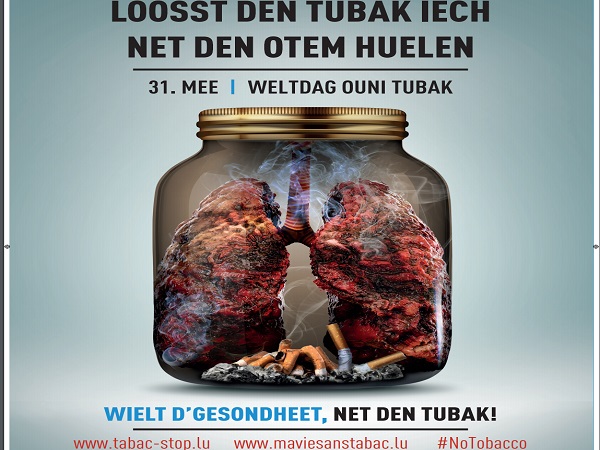
In the run-up to World No Tobacco Day, celebrated annually on 31 May, Luxembourg's Ministry of Health has joined once again the World Health Organisation (WHO) in warning of the health risks of smoking.
Tobacco is the number one cause of premature and preventable death worldwide. Smoking kills around eight million people each year worldwide, including more than 1.2 million non-smokers who have been exposed to tobacco smoke involuntarily. In Luxembourg, around 1000 deaths per year result from tobacco-related illnesses; this includes 80 deaths from passive smoking.
On this occasion, Luxembourg's Ministry of Health has relaunched its awareness campaign on tobacco and lung health and reiterates its call to smokers wishing to reduce or stop smoking to participate in the smoking cessation assistance programme. Indeed, the consequences of smoking on lung health can be dramatic: 90% of lung cancers and more than 80% of chronic obstructive pulmonary disease (COPD) are caused by tobacco; asthma is aggravated by tobacco; smoking can lead to other respiratory tract cancers, such as cancer of the tongue, pharynx, larynx, vocal cords, etc.; children exposed to tobacco smoke are more likely to get bronchitis, pneumonia, ear infections or asthma; tobacco can activate latent tuberculosis and worsen the respiratory failure of those affected.
In the current COVID-19 pandemic situation, the WHO has recalled that smoking weakens and causes respiratory illnesses. Since the COVID-19 virus attacks the respiratory system first, smokers are more likely to develop a more severe form of the disease when compared to non-smokers. Likewise, the diseases caused by tobacco, mentioned above, increase the risks of serious complications for patients infected with COVID-19.
Regarding a possible link between taking nicotine and COVID-19, suggesting that nicotine would reduce the risk of COVID-19 infection, there is currently no scientific evidence to confirm this assumption according to WHO.
The Ministry of Health has also recalled that stopping smoking is beneficial for all ages: after 48 hours of quitting, the body is better oxygenated and the respiratory function improves; after one year, breathing has returned to normal and the risk of myocardial infarction (MI) is halved; after ten years, the risk of dying from lung cancer is halved compared to that of a smoker; after 20 years, the risk has returned to that of a non-smoker.
The Smoking Cessation Programme, set up in 2008 in collaboration with the CNS to help and encourage people who want to quit smoking, provides smokers support from a health professional when they quit the habit and partially reimburses medical treatments and substitute products which may be required. For more information, visit www.tabac-stop.lu.
The information and awareness campaign "Don't let tobacco take your breath away!" aims to remind people that quitting smoking is essential to safeguard their health, well-being and quality of life.








